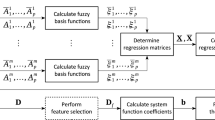Abstract
To solve fuzzy expected value model problem that widely exists in fuzzy programming field, a new hybrid intelligence algorithm based on Stochastic Particle Swarm Optimization (SPSO) algorithm is put forward in this article. Fuzzy simulation is used to get training samples for multi-layer (BP) Back Propagation artificial neural networks and multi-layer BP artificial neural networks is used to approximate fuzzy expected value function when SPSO algorithm is used to find the optimal value, the trained multi-layer BP artificial neural networks is used to calculate fuzzy expected function’s fitness value and detail steps are designed. Compared with the hybrid intelligence algorithm based on the classical Genetic Algorithm, the proposed algorithm overcomes some defects, such as taking a long time, computing complexity, easy being immersed in local extremum. The results are justified with the help of two numerical illustrations for fuzzy expected value model problem, the effectiveness of our new approach is demonstrated and it has determinate practical value.

Similar content being viewed by others
References
Liu B, Liu YK (2002) Expected value of fuzzy variable and fuzzy expected value models. IEEE Trans Fuzzy Syst 10(4):445
Liu B (2009) Theory and practice of uncertain programming, 3rd edn. Springer, Berlin
Liu B, Zhao R, Wang G (2003) Theory and practice of uncertain programming. Tsinghua University Publishing Company, Beijing
Shen Y, Wu P, Niu J, Zhang Q, Jin Y (2019) Distribution network planning method under fuzzy uncertain load. In: Proceedings of the CSU-EPSA, vol 31, no 12, pp 144–150
Chao CA, Yuxin MA, Yue CH (2016) Capacity allocation method of hybrid energy storage system based on empirical model decomposition and fuzzy chance constrained programming. Distrib Energy. 1(3):43–48
Haghighi A, Ayati AH (2016) Stability analysis of gravity dams under uncertainty using the fuzzy sets theory and a many-objective GA. J Intell Fuzzy Syst 30(3):1857–1868
Gupta P, Mittal G, Mehlawat MK (2013) Multiobjective expected value model for portfolio selection in fuzzy environment. Opt Lett 7(8):1765–1791
Mohtashami A (2014) The optimal solution for several different degrees of feasibility for fuzzy linear and non-linear programming problems. J Intell Fuzzy Syst. 27(5):2611–2622
Jianchao Z, Jie J, Zhihua C (2004) Particle swarm optimization. Science Publishing Company, Beijing
Zhang L, Xu J, Zheng Y, Huang Z, Yu J (2017) Deep feature learning for dummies: a simple auto-encoder training method using particle swarm optimisation. Pattern Recogn Lett 94:75–80
Tyagi S, Panigrahi SK (2017) An improved envelope detection method using particle swarm optimization for rolling element bearing fault diagnosis. J Comput Design Eng 4(4):305–317
Ajeena AS, Beegom MS (2019) Integer-PSO: a discrete PSO algorithm for task scheduling in cloud computing systems. Evol Intell. 12(2):227–239
Zhang J, Shen P, Zhao W (2018) AVA simultaneous inversion of prestack seismic data using particle swarm optimization. J Earth Sci 29(6):1390–1397
Li S, Cao Y (2018) Research on the text and emotion classification of particle swarm optimization in natural language processing. Mach Tool Hydraul 46(24):150–155
Elbes M, Alzubi S, Kanan T, Al-Fuqaha A, Hawashin B (2019) A survey on particle swarm optimization with emphasis on engineering and network applications. Evol Intell. 12(2):113–129
Xiao N (2014) An algorithm for solving stochastic chance-constrained programming problem. In: Frontiers of advanced materials and engineering technology II. pp 1138–1141
Xiao N (2014) Based on stochastic particle swarm optimization and random simulation for solving stochastic dependent chance programming. In: Frontiers of manufacturing and design science IV. pp. 1960–1964
Xiao N (2018) An efficient algorithm for solving FDCP problem. Computer Digital Eng 46(4):663–666
Xiao N (2014) Stochastic expected value models with stochastic particle swarm optimization algorithm. In: Computer, intelligent computing and education technology 2014, pp. 367–371
Zeng J, Cui Z (2004) A guaranteed global convergence particle swarm optimizer. J Computer Res Develop 419(8):1333–1338
Kennedy J, Eberhart RC (1995) Particle swarm optimization. In: Proceedings of ICNN’95-IEEE international conference on neral networks. IEEE, Piscataway, NJ, USA, 1995 pp 1942–1948
Xiao N (2017) An algorithm for solving FEVM problem with hybrid intelligent algorithm. Fuzzy Syst Math 31(2):82–88
Acknowledgements
The author acknowledges special scientific research project of Shaanxi Provincial Education Department (Grant: 20JK0587).
Author information
Authors and Affiliations
Corresponding author
Additional information
Publisher's Note
Springer Nature remains neutral with regard to jurisdictional claims in published maps and institutional affiliations.
Rights and permissions
About this article
Cite this article
Xiao, N. An algorithm for solving FEVM problem based on SPSO algorithm. Evol. Intel. 15, 2421–2426 (2022). https://doi.org/10.1007/s12065-020-00483-9
Received:
Revised:
Accepted:
Published:
Issue Date:
DOI: https://doi.org/10.1007/s12065-020-00483-9




